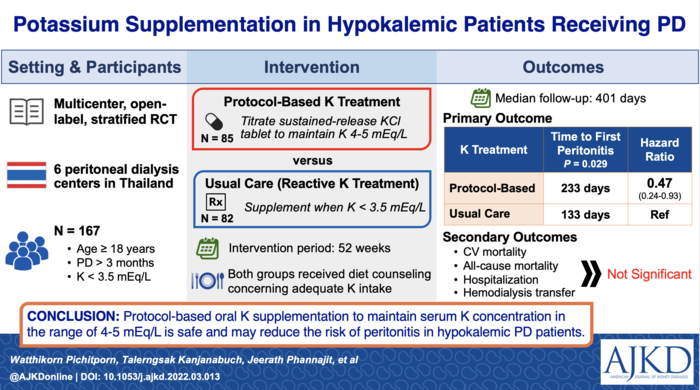This prospective, multicenter, randomized controlled trial published in the American Journal of Kidney Diseases (AJKD) demonstrated that, compared with a reactive strategy of potassium supplementation when serum potassium fell below 3.5 mEq/L, a protocol-based potassium supplementation strategy to maintain serum potassium in the target range of 4-5 mEq/L resulted in a longer time (90 days) to the first peritonitis episode, a lower hazard ratio of peritonitis, and a lesser proportion of free-peritonitis participants.

Credit: Pitchitporn et al, AJKD 2022
This prospective, multicenter, randomized controlled trial published in the American Journal of Kidney Diseases (AJKD) demonstrated that, compared with a reactive strategy of potassium supplementation when serum potassium fell below 3.5 mEq/L, a protocol-based potassium supplementation strategy to maintain serum potassium in the target range of 4-5 mEq/L resulted in a longer time (90 days) to the first peritonitis episode, a lower hazard ratio of peritonitis, and a lesser proportion of free-peritonitis participants.
Hypokalemia is commonly found in patients on peritoneal dialysis (PD) and associated with poor outcomes. A multicenter, open-label, prospective, randomized controlled trial was conducted in 167 hypokalemic patients receiving PD. It examined if a protocol-based correction of hypokalemia to maintain serum potassium 4-5 mEq/L (85 participants) could improve PD-related outcomes compared to reactive potassium supplementation administered when serum potassium levels fell below 3.5 mEq/L (82 participants). During the median follow-up time of 401 days, the protocol supplementation appeared safe and significantly reduced the risk of peritonitis. Potassium chloride tablets at the dosage used in this study (25±13 mEq/day) demonstrated promising efficacy and relatively few side effects. Most participants in the study tolerated the medications well, with only a tiny number discontinuing treatment due to adverse effects. Notably, only 4% of participants in the intervention group experienced asymptomatic hyperkalemia.
TITLE: Efficacy of Potassium Supplementation in Hypokalemic Patients Receiving Peritoneal Dialysis: A Randomized Controlled Trial
AUTHORS: Watthikorn Pichitporn, MD, Talerngsak Kanjanabuch, MD, Jeerath Phannajit, MD, Pongpratch Puapatanakul, MD, Piyatida Chuengsaman, MD, Watanyu Parapiboon, MD, Worapot Treamtrakanpon, MD, Chanchana Boonyakrai, MD, Saraporn Matayart, MD, Pisut Katavetin, MD, Jeffrey Perl, MD, Kearkiat Praditpornilpa, MD, Somchai Eiam-Ong, MD, Kriang Tungsanga, MD, and David W. Johnson, MD
DOI: https://doi.org/10.1053/j.ajkd.2022.03.013
Journal
American Journal of Kidney Diseases
DOI
10.1053/j.ajkd.2022.03.013
Article Title
Efficacy of Potassium Supplementation in Hypokalemic Patients Receiving Peritoneal Dialysis: A Randomized Controlled Trial
Article Publication Date
18-May-2022




